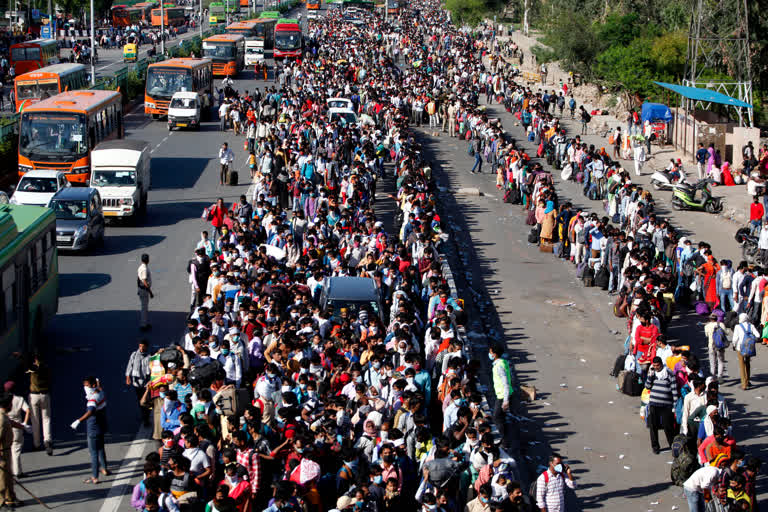Hyderabad: While the three-week-long nationwide lockdown of India by the Modi government to slow down the spread of the coronavirus is backed by sound epidemiological logic, the execution of the policy leaves much to be desired.
One major problem has been the lack of advance warning by the government, which has led to complete chaos as hundreds of thousands of migrant workers from big cities are trekking back home to their small towns and villages and getting stranded at state borders.
Similarly, no thought was given to how the poor, who make their living on daily wages would survive three weeks of lockdown.
Rather, a package to alleviate their plight was announced a few days after the lockdown began. A well-devised plan would have put the protection for the poor in place before announcing the lockdown.
The lack of forethought is also apparent from the closure of all factories, including those making medical devices at a time when this industry needs to ramp up production to provide the weapons in the battle against the coronavirus.
There is ample evidence from other countries that effective social distancing (lockdown being the extreme form of it) slows down the spread of the coronavirus.
And despite the problems with execution, the lockdown will slow down the spread of the coronavirus in India. However, it would be foolish to assume that a three-week lockdown by itself will exterminate the virus.
The extra time that the lockdown buys should be used to ramp up capacity for testing, contact-tracing, isolation, and medical care (ventilator acquisition, more ICU beds, and more non-ICU beds for less critical patients). Special efforts should be made to provide Personal Protective Equipment for all healthcare providers because they are the front-line soldiers in the battle against the coronavirus.
Also, unlike some mixed messaging on the efficacy of masks for general public (motivated by the desire to keep a limited supply of masks for healthcare workers), adequate supply of masks for everyone will protect everyone.
Since it is impossible to test everyone and even asymptomatic people with infections can spread the virus, everyone will be protected if everyone wears a mask in public as is the case in much of East Asia.
Read: COVID 2019: From Malaysia, Pakistan to Nizamuddin's crowed lanes
The economic cost of the current lockdown in India, as well as future lockdowns - a quite likely scenario, is going to be huge, with the poor bearing a disproportionately large burden of it.
However, this is going to be dwarfed by the burden of the disease for the poor if the coronavirus becomes widespread in India.
The poor in India live in close quarters, under unhygienic conditions, and have weaker immunity and higher morbidity.
They are the least likely to afford the cost of getting tested or treated for the coronavirus. There are reports that private laboratories charge several thousand rupees for a test.
The government must fully cover the cost of testing and treatment of the poor, at both private and government hospitals, so that they are encouraged to get tested if they have any symptoms.
Given their cramped living arrangements, isolation at home is not a realistic option for the poor, making it imperative for the government to make alternative arrangements.
Most importantly, when there is a surge in the serious cases of COVID-19 and the healthcare system gets overwhelmed, as has already happened in Italy, Spain, France, and the United States (in particular New York state), health care is going to be rationed.
As is well known now, the doctors in Italy had to make gut-wrenching decisions on whom to save when several patients were competing for limited hospital resources.
They followed the ethical guideline of giving priority to patients with more potential years of life left, which invariably meant saving younger/healthier patients.
For anyone familiar with the ground realities in India, it is easy to guess who the doctors are likely to save in such a situation.
There is a strong likelihood that between a rich 75-year old man and a poor 30-year old woman, the rich man will get medical priority.
The only way to prevent such situations is to develop a clear set of ethical guidelines in consultation with medical bodies such as the Indian Council of Medical Research (ICMR) so that individual doctors do not have the discretion to make unethical decisions in similar situations.
This will help doctors as well as the hospital administrators, who are going to be under tremendous stress from the work itself, with added pressure from families of patients.
When healthcare is rationed, the poor are bound to be at the end of the queue. The last thing we want is for the doctors and hospitals to decide which patients to put on a ventilator based on their ability to pay.
This makes it imperative for the government to use these three weeks of lockdown to establish strict ethical guidelines on how to prioritize care in situations where rationing is required.



